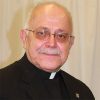Dining with his Twelve Apostles on the night before he died, Jesus took bread and blessed, broke and gave it to them, saying, “Take and eat, for this is my body.” Then he took a cup of wine, blessed it, and gave it to them, saying, “Take this, and drink from it, for this is the cup of my blood. … Do this in memory of me.”
We Catholics are so familiar with these words, we no longer truly hear them — much less appreciate their deeper meaning. They no longer shock us as they surely must have shocked the disciples. The law of Moses forbade Jews to eat a sacrificial meal and ingest blood. To ingest an animal’s blood meant its life abided within them. By sacramentally giving his flesh to eat in the form of bread, Jesus established a new, dynamic relationship between God and the disciples, who become the Body of Christ. Likewise, the consecrated wine empowers Jesus’ disciples to live new lives by drinking his Precious Blood.
Bread and wine come from wheat and grapes, and their cultivation requires land and time. God had promised Abraham and Sarah a new homeland. Bread and wine were proof that God fulfilled that promise.
To become bread, grain must first fall to the earth, die, be buried and in time rise to new life. The wheat is then harvested, threshed, ground into flour, kneaded, baked, and finally broken and shared. Similarly, wine comes from grapes whose vines require pruning. The fruit is harvested, crushed and fermented. What better symbols of the suffering and sacrifices that lead to growth and transformation in our lives?
Bread and wine are common foods, found in most Jewish meals in the Middle East. But Jesus purposely chose as his Last Supper the Passover meal, uniting his suffering and sacrifice to the memory of God’s deliverance of the Israelites from slavery.
For Jews, Passover is not the remembrance of a singular event that took place once, centuries ago. Its celebration makes that past event present today, as if participants at the meal were personally present at the Exodus. As the Passover ritual states, each generation must ask, “What has the Lord done for us?” Not them. Us.
We too must allow ourselves to be present at that Last Supper — and at Calvary and the empty tomb. More precisely, the death and resurrection of Jesus become present to us in the Eucharist.
Perhaps the key to experiencing the fullness of the mystery of the Eucharist lies in the seemingly simple command, “Do this in memory of me.” Note the first word is “do,” not “say.” The Eucharist — “this” — is a complete, dynamic set of actions, including the words of consecration: take, bless, break the bread, drink the wine, share and consume.
We’ve translated the Greek word anamnesis as “in memory of.” This translation risks reducing the Eucharist to a mental exercise. But what if we understand it as not simply remembering Jesus, but recalling him? That is, in a very physical sense of Jesus coming back to us. A recall means a concrete, actual return.
And now for the hard part! While scholars and theologians debate the fine points, we make Jesus present not just by repeating the words of consecration but by doing them. Consider the Gospel of Saint John, clearly the most eucharistic of the four gospels: there are no words of consecration at the Last Supper. In their place, we have the extraordinary scene of Jesus washing his disciples’ feet — and commanding us to do the same. For Saint John, humble service makes Jesus present here and now.
Mahatma Gandhi, observing the starving throng of humanity, stated, “If God were to come to earth, God would surely come in the form of bread.” Through acts of humble service by Christians around the world, let us declare: “God has.”
Featured Image: Maryknoll Father Edmund Cookson elevates the host while celebrating Mass in Peru, where he ministered to the Aymara people for over 50 years. (Nile Sprague/Peru)
![]()

